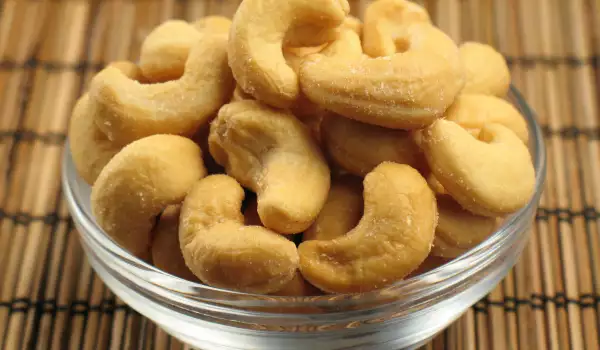The delicately flavored cashew is a favorite snack in between meals, which can be found in almost any store. Since it makes a great butter, it is a suitable supplement for salads and stir-fry dishes.
Cashew trees came from the lands of present-day Brazil and quite contrary to phylogenetic perceptions, are more closely related to mangoes than to peanuts. Cashews, known as Anacardium occidentale, are of the same family as mangoes and pistachios.
The cashew is an evergreen plant that reaches heights of up to 39.5 ft (12 meters) and its fruit-bearing life lasts up to 45 years. Very often the fruit is called the cashew apple, and in appearance it resembles a large red pear or quince. At the bottom of the cashew apple is a hidden, mossy, reniform appendage, which contains the delicious cashew nut. This kernel is steeped in highly toxic mucus that protects it from various pests.
Each cashew apple gives one nut, but a tree can give up to 300 fruits per year. This very small amount, combined with the difficult collection of the nuts, along with transport, explains the relatively high price of cashews.
Nowadays, cashews mainly grow in the lands of Africa and Asia. There it was imported by the Portuguese fleets in the distant 16th century.
The cashew tree has always been valued for its wood, cashew balm and the cashew apple, but the cashew nut only became popular in the early 20th century. Today's leading producers of cashews are India, Brazil, Mozambique, Tanzania and Nigeria.
Composition of cashews
The cashew nut is a very good source of vitamin B, folic acid and potassium. It contains befitting quantities of selenium, copper, phosphorus and magnesium.
The cashew nut has a very low glycemic index, making it a great source of slow carbohydrates.

100 grams of cashews contain 0.5 oz of protein, 292 mg of magnesium, 660 mg of potassium, 593 mg of phosphorus, 20 mg of selenium, 2.2 mg of iron, 12 mg of sodium, 5.8 mg of zinc.
Selection and storage of cashews
- If you are buying packaged cashews, check whether the package is hermetically sealed to ensure that there are no traces of moisture;
- If possible, smell the cashews to make sure that they are not spoiled;
- Recommended storage for cashews is in opaque packaging that ensures that there is no penetration of light and therefore the cashews do not go rancid. After opening the cashews, best store them in the refrigerator;
- In the fridge, cashews will last about six months or about a year in a freezer;
- Butter from cashews should be placed immediately in the refrigerator after it has been opened.
Culinary use of cashews
Cashew nuts are most often offered roasted as an appetizer to different alcoholic beverages. Cashews can be added to a variety of salads, vegetable purees, meat dishes and fish.

The cashew nut is also used in confectionery, as an ingredient in many cakes, muffins and treats. Furthermore, cashews are used in recipes with mousses, creams, ice creams, nut milks and cheeses. Roasted cashew nuts can be consumed completely on their own.
Flour can be made from cashews, which is a true delicacy from which porridge and pitas are made from. Cashew butter is also a delicacy, but is used more widely in pharmacy and medicine and less in cooking - especially in the areas where it was harvested.
Benefits of cashews
- They contain heart-healthy monounsaturated fats. Cashews not only have reduced fat content when compared to other nuts, but about 75% of their composition is of unsaturated fatty acids, and of these, 75% contain the so-called oleic acid, the same healthy heart acid which is found in olive oil.
- If you are worried about your heart - eat nuts ! After carrying out a wide variety of studies, researchers advise that to reduce the risk of cardiovascular and coronary heart disease, it is enough to simply eat a handful of cashews, other nuts or a spoonful of peanut butter at least four times a week.
- The copper contained in cashews acts as an antioxidant, produces energy and is good for bones and blood vessels. Copper plays an important role in many physiological processes, including the utilization of iron by the body, elimination of free radicals, the construction of bone and joint tissue, and the production of melanin.
- The contained magnesium takes care of our composure. Unsatisfactory quantities of magnesium can lead to high blood pressure, muscle spasms and migraine attacks, while a quarter cup of cashews a day gives us 22.3% of our daily value of magnesium.
- They help us avoid obesity. Although it is known that nuts give us a lot of cardiovascular benefits, we often avoid them because we are worried about becoming overweight. A recent study, however, showed that people who ate nuts at least twice a week were less likely to gain weight than those who did not.

Dangers of cashews
Although allergic reactions can be seen with almost any kind of food, it is known that some foods are associated with more allergies than others. About 90% of food allergies are associated with 8 types of food: tree nuts (such as cashews), fish, shellfish, cow milk, hen's eggs, soya products, peanuts and wheat.
Furthermore, cashews are among the few foods containing oxalates - natural substances found in plants, animals and the human body. When they become too concentrated in body fluids, they crystallize and may lead to some health problems. For this reason, people who have kidney stones or gallstones should avoid taking cashews.





















